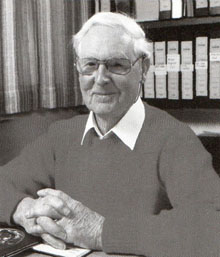Frank Fenner
Frank John Fenner (21 December 1914 – 22 November 2010) was an Australian scientist who made significant contributions to the field of virology and microbiology. He is best known for his role in the eradication of smallpox and the control of Australia's rabbit plague through the introduction of myxomatosis.
Early Life and Education[edit | edit source]
Frank Fenner was born in Ballarat, Victoria, and grew up in Adelaide, South Australia. He attended Rose Park Primary School and later Adelaide High School. Fenner went on to study medicine at the University of Adelaide, where he graduated with a Bachelor of Medicine and Bachelor of Surgery (MBBS) in 1938.
Career[edit | edit source]
Military Service[edit | edit source]
During World War II, Fenner served as a captain in the Australian Army Medical Corps. He was stationed in Papua New Guinea and worked on the control of malaria among Australian troops.
Academic and Research Contributions[edit | edit source]
After the war, Fenner joined the Walter and Eliza Hall Institute of Medical Research in Melbourne, where he worked on the myxoma virus as a biological control agent for rabbits. His work in this area was instrumental in reducing the rabbit population in Australia, which had become a major agricultural pest.
In 1949, Fenner was appointed Professor of Microbiology at the John Curtin School of Medical Research at the Australian National University (ANU) in Canberra. He later became the Director of the school from 1967 to 1973.
Smallpox Eradication[edit | edit source]
Fenner played a crucial role in the World Health Organization's (WHO) campaign to eradicate smallpox. He was a member of the Global Commission for the Certification of Smallpox Eradication and announced the eradication of the disease in 1980.
Awards and Honors[edit | edit source]
Frank Fenner received numerous awards and honors throughout his career, including:
- The Albert Einstein World Award of Science in 1988
- The Copley Medal from the Royal Society in 1995
- The Companion of the Order of Australia (AC) in 1989
Legacy[edit | edit source]
Fenner's contributions to science, particularly in the fields of virology and microbiology, have had a lasting impact. The Fenner School of Environment and Society at ANU is named in his honor, reflecting his commitment to both medical research and environmental science.
Related Pages[edit | edit source]
Categories[edit | edit source]
Search WikiMD
Ad.Tired of being Overweight? Try W8MD's physician weight loss program.
Semaglutide (Ozempic / Wegovy and Tirzepatide (Mounjaro / Zepbound) available.
Advertise on WikiMD
|
WikiMD's Wellness Encyclopedia |
| Let Food Be Thy Medicine Medicine Thy Food - Hippocrates |
Translate this page: - East Asian
中文,
日本,
한국어,
South Asian
हिन्दी,
தமிழ்,
తెలుగు,
Urdu,
ಕನ್ನಡ,
Southeast Asian
Indonesian,
Vietnamese,
Thai,
မြန်မာဘာသာ,
বাংলা
European
español,
Deutsch,
français,
Greek,
português do Brasil,
polski,
română,
русский,
Nederlands,
norsk,
svenska,
suomi,
Italian
Middle Eastern & African
عربى,
Turkish,
Persian,
Hebrew,
Afrikaans,
isiZulu,
Kiswahili,
Other
Bulgarian,
Hungarian,
Czech,
Swedish,
മലയാളം,
मराठी,
ਪੰਜਾਬੀ,
ગુજરાતી,
Portuguese,
Ukrainian
Medical Disclaimer: WikiMD is not a substitute for professional medical advice. The information on WikiMD is provided as an information resource only, may be incorrect, outdated or misleading, and is not to be used or relied on for any diagnostic or treatment purposes. Please consult your health care provider before making any healthcare decisions or for guidance about a specific medical condition. WikiMD expressly disclaims responsibility, and shall have no liability, for any damages, loss, injury, or liability whatsoever suffered as a result of your reliance on the information contained in this site. By visiting this site you agree to the foregoing terms and conditions, which may from time to time be changed or supplemented by WikiMD. If you do not agree to the foregoing terms and conditions, you should not enter or use this site. See full disclaimer.
Credits:Most images are courtesy of Wikimedia commons, and templates Wikipedia, licensed under CC BY SA or similar.
Contributors: Prab R. Tumpati, MD

